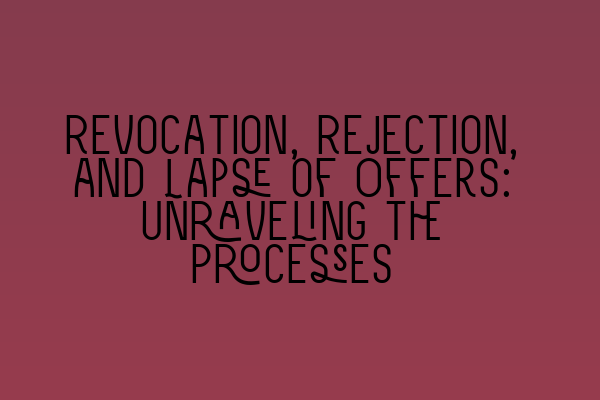Revocation, Rejection, and Lapse of Offers: Unraveling the Processes
When it comes to contract law, the processes surrounding revocation, rejection, and lapse of offers can be quite intricate. Understanding these processes is crucial for solicitors and legal professionals, as well as anyone entering into contractual agreements. In this blog post, we will delve into these processes and shed light on the key considerations involved.
Revocation of Offers
Revocation refers to the act of retracting or withdrawing an offer before it is accepted. Generally, an offer can be revoked at any time before acceptance, unless it has been made irrevocable through an option contract or other binding agreement. The revocation of an offer can occur through various means, such as by directly informing the offeree of the revocation, by a third party conveying the revocation, or even through the conduct of the offeror.
For instance, consider a scenario where Party A offers to sell their car to Party B for a certain price. Before Party B accepts the offer, Party A decides to sell the car to another buyer. Party A must promptly communicate the revocation to Party B to ensure its effectiveness. It is important to note that revocation is only valid when it is received by the offeree. Therefore, if the revocation is communicated through a letter, it is only effective when it is actually received by the offeree.
Rejection of Offers
Rejection occurs when the offeree expressly declines the offer made by the offeror. The rejection can be communicated orally, in writing, or through conduct that is inconsistent with accepting the offer. Once the rejection is communicated, the offer is terminated, and the offeree cannot later accept the offer unless the offeror reinstates it.
Let’s consider a hypothetical scenario where Employer A offers Job Applicant B a position at their company. However, Job Applicant B declines the offer by sending an email expressing their gratitude for the opportunity but stating that they have decided to pursue other opportunities. At this point, the offer has been rejected, and Employer A is free to offer the position to another candidate.
Lapse of Offers
If an offer is not revoked or rejected, it may eventually lapse, rendering it no longer available for acceptance. The lapse of an offer can occur in various situations, such as when the offer has a specific deadline for acceptance and that deadline passes without acceptance. Additionally, an offer may lapse if the offeree fails to accept within a reasonable time period.
For example, if Seller A offers to sell their property to Buyer B and specifies that the offer will expire after 30 days, the offer lapses if Buyer B does not accept within the designated time frame. Similarly, if an offer does not specify a deadline, it may still lapse if the offeree delays acceptance for an unreasonably lengthy period.
Conclusion
Understanding the processes of revocation, rejection, and lapse of offers is vital in navigating the complex realm of contract law. By comprehending these concepts, solicitors can provide informed advice and representation to their clients, ensuring the protection of their rights and interests.
If you enjoyed this article, you may be interested in reading more about legal practice and decision-making in real-life case studies. Check out our related article, “Unveiling Real-Life Case Studies: Insights into Legal Practice and Decision-Making.”
Additionally, for those aspiring to become solicitors, exploring solicitor salaries and the factors affecting income can provide valuable insights. Discover more in our article, “Exploring Solicitor Salaries in the UK: Average Earnings and Factors Affecting Income.”
Building strong client relationships is another key aspect of being a successful solicitor. Enhance your client relationship management skills with our article, “Mastering Client Relationship Management: Skills for Solicitors to Enhance Trust and Loyalty.”
If you are considering pursuing a law school education in the UK, it is essential to choose the right path for your future. Find guidance and information in our article, “Pursuing a Law School Education in the UK: Choosing the Right Path for Your Future.”
And finally, for those embarking on the journey to becoming a solicitor, securing training contracts is a critical step. Access our comprehensive guide, “Securing Training Contracts: A Roadmap to Becoming a Solicitor.”
At SQE Contract Law, we are dedicated to providing valuable resources and insights to help you navigate the legal landscape effectively. Stay tuned for more informative articles and updates on various aspects of contract law.
